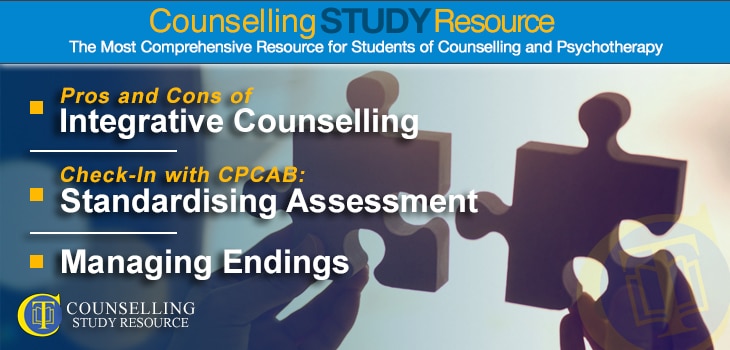141 – Pros and Cons of Integrative Counselling
Standardising Assessment Levels – Endings in Counselling
In episode 141 of the Counselling Tutor Podcast, Ken Kelly and Rory Lees-Oakes look at the pros and cons of integrative counselling, and compare it with eclectic counselling. ‘Check-In with CPCAB’ then focuses on standardising assessment levels across awarding bodies, before ‘Practice Matters’ discusses endings in counselling.
* BACPAC practice management software for counsellors and psychotherapists is a sponsor of the Counselling Tutor Podcast.
Get a 30-day free trial of BACPAC and a 30% discount by using the discount code CT2020
Pros and Cons of Integrative Counselling (starts at 1.55 mins)
‘What is integrative counselling?’ and 'What are the pros and cons of integrative counselling?' are questions that are often posed on the Counselling Tutor Facebook group.
If you’re not already a member, do come along and join in our discussions of current topics in the world of counselling and psychotherapy with 28,000 counselling students, qualified counsellors and counselling tutors.
There is no single answer to these questions, but the term ‘integrative counselling’ is generally used to refer to a blending of two or more theoretical approaches in counselling to meet the individual client’s needs.
Integrative counselling began in the 1990s, when various theorists began to believe that blending modalities might be helpful. Some course providers now train students specifically in integrative counselling.
Different modalities do tackle clients’ issues in different ways – for example, person-centred therapy focuses on emotions while cognitive behavioural therapy (CBT) looks at thoughts and behaviours (and offers specific strategies and techniques to tackle certain issues).
While integrative counselling seeks to address any potential theoretical conflicts between modalities, eclectic counselling instead draws separately on different modalities as appropriate – in this sense, the latter is rather like having a tool box, the different contents of which practitioners use on an ad hoc basis.
Potential cons of integrative counselling include theoretical dilution and conflict in practitioners (who are required to blend two or more different sets of language).
Rory has written a handout on the pros and cons of integrative counselling; this is available here, or through the Handouts Vault and Counselling Study Resource (CSR).
On the Counselling Tutor website, you can also read an article by integrative therapist Erin Stevens, and download a handout on the four types of integration.
Check-In with CPCAB: Standardising Assessment Levels (starts at 12.05 mins)
Rory talks to Heather Price (Senior Counselling Professional) at CPCAB (Counselling & Psychotherapy Central Awarding Body) about how awarding bodies standardise assessment, ensuring consistency in counselling training.
This is important for both students (so they know they will receive broadly equal training at any course provider offering a particular level of course) and employers (who need to know they can rely on counsellors’ competence).
Ofqual is a key body in ensuring these standards, encouraging fairness, transparency and universality in counselling training.
Heather explains that CPCAB itself uses various methods to ensure consistency across its own course providers:
- requesting the CV of every course tutor
- providing standardisation training events for tutors, with set requirements for frequency of attendance
- marking the external assessments, allowing the awarding body to pick up any underperforming centres and to take action to tackle these via external verification
- moderating internal assessments (i.e. using a second marker for a sample of the group).
You can find more information about CPCAB on its website. CPCAB is the UK’s only awarding body run by counsellors for counsellors.
Endings in Counselling (starts at 24.50 mins))
Ken and Rory look at endings in counselling, a topic that is highly relevant to counselling of all types, even if there is no fixed number of sessions. They assert that preparing for ending should be a regular part of the counsellor’s work, starting in the very first session (during contracting).
How you approach and feel about endings is influenced by your own attachment style.
There are three key stages to planning for ending:
- Assess the client’s readiness to end.
- Acknowledge the relationship and trust that have been built.
- Think about how to empower the client in their continued journey forward, e.g. through building resilience, making an appropriate referral, or signposting the client to other sources of support.
Of course, not all endings are planned; the client may end suddenly; this can be difficult for the counsellor (again affected by your attachment style: possibly material for personal therapy). It can be helpful to take unplanned endings to supervision.
In the brand-new section of the CSR – Practice Partner, especially designed for qualified counsellors – you’ll find a lecture by Rory on endings, including a downloadable slide pack.
Practice Matters is sponsored by Bacpac, client-management software for counsellors and psychotherapists.
Bacpac offers all Counselling Tutor Podcast listeners a 30% discount, which you can claim by visiting the Bacpac website and using the code CT2020.
Free Handout Download
Advantages and Disadvantages of Integrative Approaches
